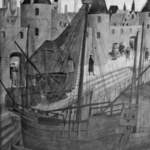Four Golden Ages: Regional Interdependency in the Low Countries
DOI:
https://doi.org/10.18352/bmgn-lchr.8077Keywords:
Economic developmentAbstract
Although the Low Countries formed a political unity only for short periods they have been seen by other European nations as a region in its own right. What created some kind of unity, as experienced by the inhabitants? My concept started from the geographical conditions of a delta of three major rivers, in a generally flat area facilitating transport. This was a basic condition for urban growth.
The core questions were therefore – what at different times in the various regions, led to that extraordinary level of urbanisation on a European scale? Why and how did the successive ‘golden ages’ come to an end, and what remained in the previous core areas? Why did some regions remain peripheral? How do the various aspects interrelate – geographical conditions, social and political institutional arrangements, economic developments, and how do cultural phenomena fit into these patterns?
This response is part of the discussion forum 'Four Golden Ages' (Wim Blockmans).
Downloads

Downloads
Published
Issue
Section
License
Authors who publish with this journal agree to the following terms:
a) Authors retain copyright and grant the journal right of first publication with the work simultaneously licensed under a Creative Commons Attribution 4.0 International (CC BY 4.0) that allows others to share the work with an acknowledgement of the work's authorship and initial publication in this journal.
b) Authors are able to enter into separate, additional contractual arrangements for the non-exclusive distribution of the journal's published version of the work (e.g., post it to an institutional repository or publish it in a book), with an acknowledgement of its initial publication in this journal.
c) Authors are permitted to post their work online (e.g., in institutional repositories or on their website) prior to and during the submission process.
Authors are explicitly encouraged to deposit their published article in their institutional repository.











